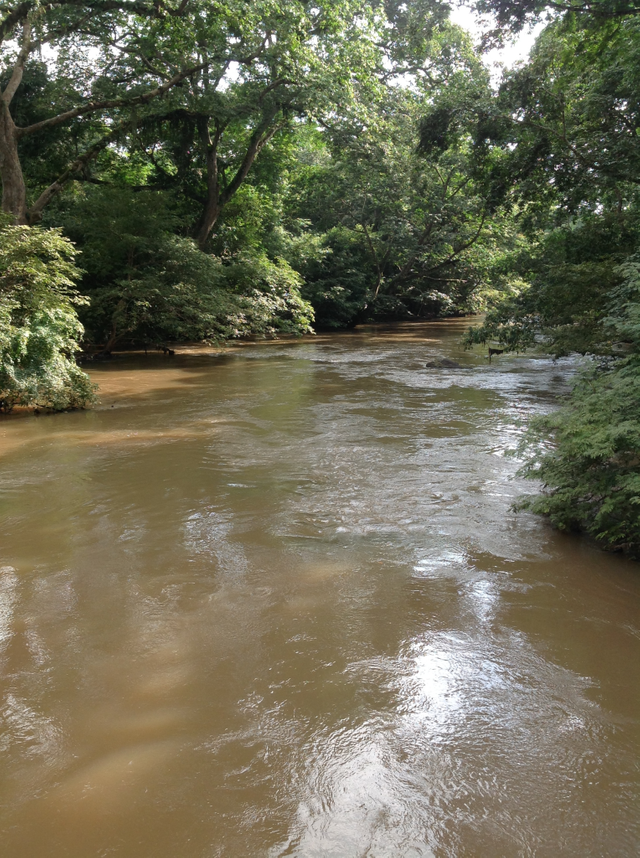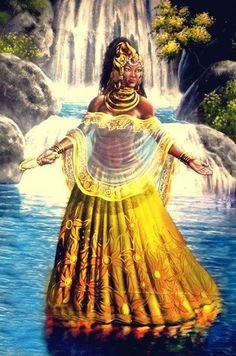OSHUN - THE GODDESS OF LOVE, BEAUTY, PLEASURE, FERTILITY AND FRESH WATER.
Revered for her sensuality, beauty, love, posperity and fertility. Oshun, also spelt as osun in yoruba language (ochún or oxúm in Latin) was known to be generous and kind goddess with a touch of hidden tempestuous temper which rarely come to the surface. Just as Venus is to the Romans, osun is the love goddess of the Yoruba people of the South Western part of Nigeria extending to other part of west Africa and some part of South America.
Oshun was depicted as a young beautiful and charming woman with a deep love for shining and glittering ornaments like gold, beads, mirrors, elaborate clothing and fan which explains why she is always associated with colours like yellow, amber and gold.
Loved by all not only for benevolence but she was acclaimed as protector of the poor, helper of the sick, provider to the orphans and mother to all. She delighted all the senses with artistry, sensual, dance steps and she was said to possess unmatchable cooking skills that made her favourite of her husband, Shango (or Sango) the god of thunder, among other wives.
Oshun possessed fertility and healing power, including power of prosperity. She was vast in agriculture and had great business acumen. She learnt mysticism and the act of divination from her father Obatala, the first created diety. Her elder sister was Yemaja, the goddess of salt water and she was married to the god of thunder, Shango.
Centuries ago, Some group of hunters led by Larooye in search of water settled near a river, now known as osun river in present day osun state in Nigeria. These hunters who were preparing the ground for their settlement and new planting season fell a tree into river. Immediately they heard a woman voice saying "Gbogbo ikoko mi leti go tan" (meaning; you have broken all my dye pot). Latoroye with other powerful men in the community pacified the goddess of the river, which was discovered to be oshun and made a pact to be worshipping her annually in exchange for their staying in the community.

Credit
Oshun is still been honoured annually with very elaborate festival. People from Nigeria and abroad gather annually for the 12 day festival offering worship, sacrifice to Oshun river and then draw from the river. The water is believed to have medicinal power, brings prosperity, fertility and good luck.

Credit
Thank you for reading.
This post is my entry for @therneau's the African Goddess Short Story Competition.
Don't forget to upvote to encourage me, resteem for others and comment to share your thoughts.

Your Post Has Been Featured on @Resteemable!
Feature any Steemit post using resteemit.com!
How It Works:
1. Take Any Steemit URL
2. Erase
https://3. Type
reGet Featured Instantly – Featured Posts are voted every 2.4hrs
Join the Curation Team Here
Thank you for your entry to Teamsouthafrica's competition. @teamsouthafrica will resteem your post :)
It was interesting to learn more about Oshun since I collect some African tribal art and have a beautiful Yoruba kneeling mother daughter statue. The Yoruba part being quite relevant to your post. Not too sure though if it's a fake piece since tribal art has been copied over the years due to the value. Whether it is or not, I think it's a beautiful piece of artwork :)
Kneeling down is sign of showing respect by a woman or girl to her husband or someone older. Yoruba culture believe any woman that didn't do that is not well trained and will be frowned at.
I don't know the piece you have but it may likely be yemoja or osun because they are both associated with children a lot. Yemoja is depicted as having a 'fish like' legs and very beautiful which is why we call an 'extremely' beautiful woman 'mammy water' (spirit from a big river) in our pidgin English.
Please keep that piece of artwork, even the fake ones are harder to get. You may have a real deal.
Thanks for the great response :) I'll be doing some posts in future relating to tribal art and some of my pieces I collected over the years. Yoruba, lega, chokwe etc. Love them so definitely won't be letting go any time soon. It really is amazing how, with minimal tools, such beautiful pieces are created. What I also love about African art is the depth and meaning that the pieces hold for the relevant cultures.
I love your passion for African culture and art.
Let me know if you ever need information about Yoruba culture. There are still old folks around with deep and authentic knowledge of Yoruba culture, history and art. They are better source than the internet.
Oh wow, that is very kind of you. Thank you :)
I think I only have the one Yoruba piece in my collection. Found it at a second hand dealer that bought it at an estate sale. It would be interesting to know a little more about it.
As you've mentioned the internet (even books) aren't the greatest of sources. I think the main problem is that there are so many diverse cultures that it's near impossible to get an expert in African tribal art.
You need experts in either Yoruba, Chokwe, Fang etc. since even by region, the artworks can be slightly different for the same tribe.
I've tried on various occasions to get someone to verify my pieces however the expertise just isn't available around here.
Yaaaass!!!!! LOVE THE POST